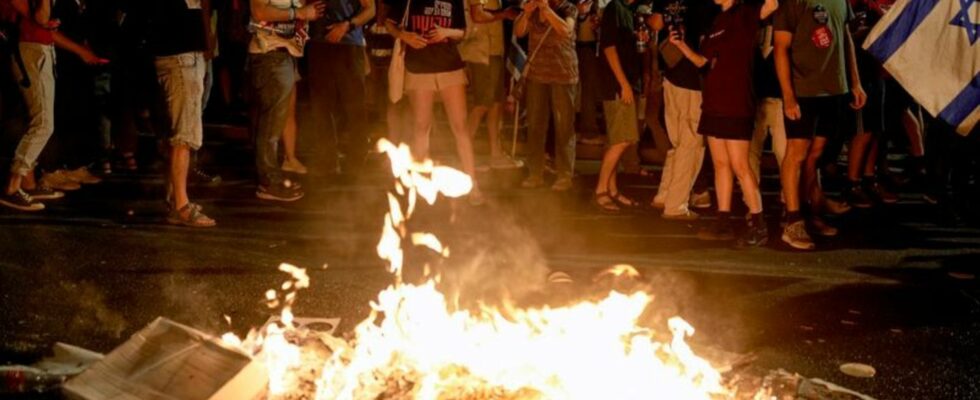War in the Middle East
Clashes during protests against Netanyahu
Demonstrators demand new elections and the release of the hostages held by Hamas in the Gaza Strip. Photo
© Ohad Zwigenberg/AP
The intensity of the protests against the Netanyahu government has recently increased. New demonstrations have resulted in injuries. The news at a glance.
In new protests against the government of the Israeli Prime Minister Clashes broke out between demonstrators and police officers in Jerusalem following the Israeli Prime Minister Benjamin Netanyahu’s visit. At least three people were injured and eight others were arrested, the newspaper “Haaretz” reported. The demonstrators demanded new elections and an agreement that would lead to the release of the remaining Israeli hostages held by the Islamist Hamas.
A few hours earlier, the head of government had dissolved the war cabinet, which had made important decisions regarding the Israeli army’s fighting with Hamas in the Gaza Strip and also the conflict with the Shiite militia Hezbollah in Lebanon. Meanwhile, a senior adviser to US President Joe Biden met with Netanyahu to discuss how to defuse the escalating tensions with Hezbollah.
The violent clashes in Jerusalem took place in front of Netanyahu’s private residence. According to reports from “The Times of Israel”, the police used water cannon to break up the protests. According to reports, tens of thousands of people had previously taken part in a large demonstration in front of the Israeli parliament – the Knesset.
For months, there have been repeated mass protests against the government in Israel. Netanyahu is accused by his opponents of giving in to the wishes of his extremist coalition partners and therefore thwarting negotiated solutions. He denies this and blames the intransigence of Hamas for the stagnation in the indirect negotiations. Recently, the intensity of the protests against the Netanyahu government has increased.
Dissolution of the War Cabinet
The dissolution of the war cabinet took place just over a week after Minister Benny Gantz withdrew from Israel’s emergency government. Government sources said that Netanyahu would discuss critical decisions regarding the current conflicts in smaller forums in the future.
Gantz joined the three-member war cabinet to demonstrate unity after the terrorist attack by Hamas and other extremist Palestinian groups on southern Israel on October 7 last year. However, the former general and defense minister announced his resignation a week ago due to differences of opinion regarding the Gaza war. He criticized the government for not developing a plan for a post-war order in the Gaza Strip.
In the terrorist attack on October 7, around 1,200 people were murdered and another 250 were taken hostage. According to information from the Hamas-controlled health authorities – which cannot be independently verified – more than 37,000 Palestinians have been killed in the war that was triggered by the attack.
Mediation efforts in the Israel-Hezbollah conflict
According to reports in the Jerusalem Post, US envoy Amos Hochstein met with Netanyahu, Gantz, President Isaac Herzog and Defense Minister Joav Galant. The minister gave a report on developments on Israel’s border with Lebanon in the north, Galant’s office said. He described “the daily attacks by Hezbollah against Israeli communities” and the efforts of the armed forces to thwart the plans of the “Hezbollah terrorists.”
Since the start of the Gaza war more than eight months ago, the situation in the border region with Lebanon has deteriorated significantly, and there are now almost daily clashes. The Hezbollah militia, supported by Israel’s arch-enemy Iran, is allied with Hamas in the Gaza Strip, but is considered to be much more powerful. Hezbollah recently increased its attacks after the Israeli military deliberately killed one of its commanders last week.
The USA is warning against an escalation of the conflict. “We do not want any escalation in the north. We have made that clear to the Israeli government,” said US State Department spokesman Matthew Miller. Hezbollah’s attacks are “unacceptable” and from the USA’s point of view the conflict should be resolved diplomatically. According to media reports, Hochstein also wanted to travel to Lebanon for talks.
Israel sees itself on the verge of achieving its war goals in Rafah
With regard to the fighting in Gaza, the Israeli army is confident that it will soon achieve its military objectives in the offensive in the southern city of Rafah. Half of Hamas’ combat units have been destroyed and 60 to 70 percent of the city’s territory is under “operational control” of Israeli troops, the army announced. It will only take a few more weeks until the military operation is completed.
Israel’s army began operations in Rafah on the border with Egypt at the beginning of May. The declared aim was to destroy the last Hamas fighting units. The plan was highly controversial internationally because more than a million Palestinians were in Rafah at the time. Most of them had fled there from other parts of the Gaza Strip before the war. Almost all of these people have now fled the city to an area to the west, where they can only be supplied with difficulty.

